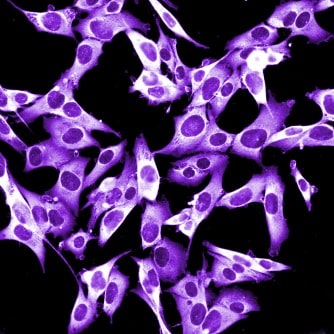Malignant melanoma is a difficult cancer to treat due to the rapid development of resistance to drugs targeting single proteins. Numerous scientific teams are working on new approaches to overcome the natural limitations of drugs, including loading them into nanoparticles. Previously, Gavin Robertson, from The Pennsylvania State University College of Medicine (Pennsylvania, USA), and colleagues discovered the cancer-fighting characteristics of leelamine, a substance derived from pine bark. But leelamine cannot be given by mouth because of poor uptake in the gastrointestinal tract or be injected intravenously because it causes damage to red blood cells. To address this issue, Robertson and his team developed a new nanoliposome that loads leelamine, called Nanolipolee-007. Nanolipolee-007 can be injected intravenously without causing damage to red blood cells. It then accumulates in tumors because of its small size where it releases the drug to kill the cancer cells. Leelamine is the first of a new unique class of drugs that inhibits cholesterol movement around a cancer cell to shut down signals needed for cancer cell survival. As a result, protein pathways like the PI3K, MAPK and STAT3 that are highly active and help cancer cells multiply and spread, are turned off and the cancer cells die. Since normal cells are not addicted to the high levels of activity of these pathways that occur in cancer cells, the drug has a minor effect on them. The study authors write that: “a unique clinically viable nanoparticle-based drug has been developed containing leelamine for the treatment of melanoma that acts by inhibiting the activity of major signaling pathways regulating the development of this disease.”
Targeted Melanoma Therapy via Nanoparticle Innovation
Gowda R, Madhunapantula SV, Sharma A, Kuzu OF, Robertson GP. “Nanolipolee-007, a novel nanoparticle-based drug containing leelamine for the treatment of melanoma.” Mol Cancer Ther. 2014 Oct;13(10):2328-40.
RELATED ARTICLES




